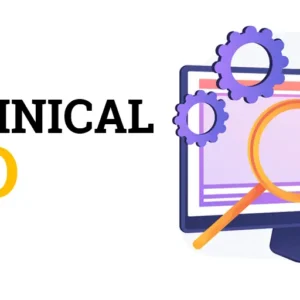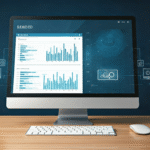
Key Highlights
- Discover how ERP systems facilitate administrative tasks for educational institutions, providing a cohesive platform that enhances efficiency within Australian schools.
- Examine key components such as admissions, fee collection, and human resources in sophisticated school ERP systems, which assist schools in streamlining their operations.
- Explore how communication tools and mobile applications foster collaboration and dialogue, thereby enhancing school management.
- Understand how educational ERP can enhance operational efficiency while delivering two essential outcomes that schools desire: improved data accuracy and seamless daily operations.
- Investigate the methods schools employ to ensure robust data security, adhere to compliance regulations, and utilize tools that promote better student performance.
- Review best practices that facilitate the smooth implementation of ERP systems in Australian schools, ensuring they achieve clear and measurable success.
Introduction
Effectively managing a school can be challenging. There is a significant amount of data to monitor and numerous administrative responsibilities to fulfill. Enterprise Resource Planning (ERP) software can assist in addressing these issues. It provides contemporary solutions to streamline operations. These ERP systems are specifically designed for educational institutions. They consolidate various school management functions into a unified platform. Tasks such as tracking student attendance, collecting fees, and facilitating communication can all be managed in one location. The ERP software enhances accuracy, increases speed, and promotes greater productivity. Schools can leverage this technology to improve organization and explore innovative approaches to their operations.
Understanding ERP Systems in Australian Schools
Australian schools face various challenges that they must address on a daily basis. Effective school management systems are essential to assist with their operations. Educational ERP systems can provide significant support. These systems are designed to manage repetitive tasks, thereby reducing the need for individuals to perform the same duties repeatedly. As a result, teachers and staff are afforded more time to focus on other critical responsibilities. The seamless integration of these systems facilitates the unification of diverse administrative processes, which can enhance operational efficiency by improving the overall workflow within the school.
Furthermore, educational software enables communication and collaboration among all departments in a transparent manner. This fosters the sharing of information and ideas among staff, parents, and students. With financial management tools and mechanisms to monitor student performance, ERP systems contribute to the effective administration of the school. By implementing these systems, schools can enhance their operations and provide an improved learning experience for both students and their families.
Definition and Core Purpose of ERP for Schools
Enterprise Resource Planning (ERP) for educational institutions is a software solution that consolidates various aspects of school management into a single system. Unlike utilizing separate programs for each task, a school ERP provides a unified platform for managing all administrative responsibilities.
The primary objective of ERP is to eliminate the necessity for manual tasks that consume valuable time and resources. It encompasses a wide range of functions, from data entry to attendance tracking. With ERP, school administrators can accomplish their duties more efficiently and with reduced effort. Additionally, it enhances data accuracy, resulting in fewer errors in student records and financial documentation.
The system facilitates communication and information sharing among all stakeholders—parents, teachers, and students. An ERP system simplifies the process of staying informed and connected. Furthermore, these platforms incorporate compliance checks and robust security features, ensuring the protection of student data and critical documents from unauthorized access. By implementing enterprise resource planning in educational settings, schools can streamline their administrative operations, allowing them to focus more on delivering quality education rather than merely managing paperwork or data.
Evolution of School Management Solutions
Years ago, educational institutions relied heavily on paper and required significant manual effort to manage daily operations. The introduction of school management systems marked a pivotal moment in the digital transformation of education. These systems enabled schools to transition from traditional methods to streamlined computer applications.
Over time, these school management systems evolved into sophisticated education ERP solutions. Today, ERP tools are designed to facilitate seamless integration across various departments. Schools utilize specialized components for admissions, examinations, fee collection, and inventory management. All of these features contribute to simplifying processes, from enrollment to monitoring students’ academic progress.
Over time, these school management systems evolved into sophisticated education ERP solutions. Today, ERP tools are designed to facilitate seamless integration across various departments. Schools utilize specialized components for admissions, examinations, fee collection, and inventory management. All of these features contribute to simplifying processes, from enrollment to monitoring students’ academic progress.As a result, the digital transformation has profoundly impacted the operational efficiency of schools. It reduces costs by automating repetitive tasks and enhances tracking and resource utilization. Consequently, both higher education institutions and K-12 schools can dedicate more time and resources to improving the learning experience for students.
Key Benefits of Implementing ERP in Education
ERP solutions provide significant advantages for educational institutions such as schools, colleges, and universities aiming to enhance their operations. Firstly, they improve operational efficiency by automating routine tasks such as attendance tracking and fee management. Secondly, these systems contribute to improved data accuracy by reducing errors that frequently occur during manual data entry.
With robust features in school management software, ERP systems facilitate better communication among all stakeholders. They also clarify financial matters for everyone involved and assist in maintaining essential security protocols. Consequently, ERP software and school management tools have become essential in contemporary educational environments.
Enhancing Operational Efficiency
Operational efficiency plays a crucial role in the administration of schools. The implementation of ERP software can enhance the operational capabilities of educational institutions by reducing the reliance on manual tasks. It aids in eliminating bottlenecks within various processes. Tasks such as tracking student attendance, collecting fees, and managing examinations can all be automated. This automation allows for a greater allocation of time and resources towards more significant responsibilities.
For instance, school ERP systems include tools designed for attendance tracking. These tools can utilize RFID technology to maintain precise records that are resistant to tampering. Additionally, they provide the ability to generate reports without the need for manual verification. In terms of financial management, the digital generation of invoices through ERP software minimizes errors in financial documentation. It also offers convenient payment options for individuals.
With the use of school ERP software, educators and administrators are afforded more time to focus on developing lesson plans and enhancing student learning experiences. Consequently, schools can effectively manage their operations and maintain a high standard of performance on a daily basis. The adoption of school ERP simplifies processes, accelerates operations, and upholds quality standards.
Streamlining Communication Across Stakeholders
Effective communication is crucial in any educational institution. ERP software provides schools with the necessary communication tools to connect parents, teachers, and students. These ERP systems facilitate the sharing of information, ensuring clarity and transparency. The tools are user-friendly. Schools can send notifications such as attendance alerts, test schedules, and reminders for fee payments directly to your mobile application.
With these ERP software tools, parents and teachers can communicate through parent-teacher portals. This enables parents to stay informed about their child’s educational experience. Additionally, school staff, including administrators, utilize dashboards. These dashboards compile data from various areas of the school, presenting all essential information in real time.
These ERP systems offer more than just messaging capabilities. They foster communication and collaboration among school community members. They contribute to building trust and enhancing relationships. Therefore, when a school implements these ERP software solutions, it promotes unity within the entire community. In this manner, effective communication leverages ERP tools to improve outcomes for everyone in the educational environment.
Essential Modules in a School ERP System
A robust school ERP system comprises various components known as ERP modules. These ERP modules assist in a range of functions related to both school administration and educational processes. From managing admissions to overseeing inventory, each ERP module collaborates with the others. This synergy enhances the school’s efficiency and eliminates unnecessary time and effort.
The most crucial ERP modules are designed for functions such as fee collection, academic management, and attendance monitoring. These tools aim to ensure data accuracy and accountability within the school. By utilizing these components of ERP software, schools achieve clearer data presentation and facilitate smoother communication among staff members. Additionally, schools improve their resource management and mitigate issues related to lost or missing supplies. These ERP modules are fundamental to any effective school ERP system.
Admissions and Enrollment Management
The Admissions and Enrollment module facilitates the application process for students seeking to enroll in schools while ensuring high data accuracy. This essential ERP module streamlines student enrollment, eliminating the need for school staff to perform each step manually. Consequently, the process becomes more efficient and seamless.
Key features include:
- Online registration: Students have the ability to apply online, simplifying the application submission process for all parties involved.
- Real-time tracking: Both students and parents can monitor the progress of the application at any given moment.
- Document management: Schools are able to securely store important documents such as ID cards and transcripts.
- Fee integration: The system connects fee collection with the enrollment procedures, thereby reducing the likelihood of admissions-related issues.
By implementing more automated workflows, schools significantly decrease the potential for errors. This not only saves time for staff but also enhances trust in the process among all stakeholders. Ultimately, this approach enables schools to manage student information effectively and transparently.
Academic and Examination Administration
This module simplifies the management of academics and examinations. It assists in various aspects, from planning to monitoring student performance. Educational institutions receive tools to safeguard question papers and conduct online assessments with automated grading.
Feature
Functionality
Exam Scheduling
Makes timetables using what is needed in the curriculum.
Online Exams
Lets teachers grade work without doing it by hand.
Result Generation
Helps share results quickly and correctly.
Student Analytics
Gives ways to see how one or all students are doing.
The academic administration module provides greater transparency for schools. Additionally, it simplifies the management of examinations. By utilizing an education ERP, schools ensure that their academic operations run efficiently.
Improving Student Experience with ERP
Education ERP systems enhance the student experience in numerous ways. These ERP systems automate processes such as attendance tracking. Additionally, online academic platforms enable students to progress in their learning seamlessly.
Furthermore, education ERP tools provide significant assistance to teachers. They are relieved from spending excessive time on administrative duties. Consequently, teachers can dedicate more time to developing learning plans tailored to each student. Students receive timely academic updates, performance reports, and improved communication channels with their teachers.
ERP systems transform the traditional educational approach. They emphasize creating a smooth and engaging experience for both students and teachers. This leads to increased efficiency and engagement for all parties involved.
Attendance Tracking and Student Progress Monitoring
The attendance tracking module transforms how educational institutions monitor students and staff. It includes integrated tools such as biometric scanners to ensure the accuracy of records and prevent any alterations.
By utilizing the system to record daily attendance and dispatch immediate notifications to parents in the event of an absence, schools promote accountability among all parties involved. Furthermore, attendance information is linked with progress monitoring dashboards, enabling administrators and educators to comprehensively oversee student performance.
When tracking is combined with reporting, it fosters collaboration among parents, teachers, and administrators, ultimately leading to improved learning outcomes.
Parent-Teacher Communication Portals
Ensuring effective communication between parents and teachers is essential for the smooth functioning of schools. ERP systems provide dedicated parent-teacher portals that facilitate real-time interactions among all parties involved.
These platforms automatically send updates regarding attendance, academic progress, and upcoming events. With integrated messaging features, parents and teachers can communicate directly with one another. The inclusion of notifications and a mobile app connection simplifies the process of staying in touch for everyone.
These portals play a crucial role in eliminating communication gaps. They contribute to the development of a supportive and well-informed school community. ERP solutions enable schools to maintain an open environment where collaboration is encouraged, and everyone is aware of ongoing activities.
Conclusion
In conclusion, implementing an ERP system in educational institutions can transform operational processes and enhance overall efficiency. It also contributes to an improved learning environment for both students and faculty. By adopting essential modules such as admissions management, academic administration, and financial management, schools can achieve greater organization and increased productivity.
Furthermore, these systems provide tools that facilitate communication between parents and teachers, which is crucial for student development. As educational institutions continually evolve, embracing new technology becomes imperative. This is the pathway to achieving success.
If you are looking to enhance your school management, please reach out to us. We offer a complimentary consultation to explore how our ERP solutions can benefit your institution.
Frequently Asked Questions
What is the most important module in a school ERP system?
The student management module is essential for the operation of a school. It significantly simplifies administrative tasks, including enrollment and attendance. With this module, all stakeholders—teachers, parents, and administrators can access student information from a single source. This facilitates smooth school operations for everyone involved.
How does ERP software support compliance in Australian schools?
ERP software assists educational institutions in adhering to regulations by automating school operations and ensuring high data accuracy. It employs security protocols, including encryption and routine audits, to safeguard financial data and other critical information. Consequently, schools can comply with governmental requirements while protecting the data they possess regarding students and financial matters.
Can ERP systems be customized for different school sizes?
ERP systems have the capability to evolve alongside your educational institution. They can be configured to meet your specific requirements. Consequently, both large and small schools can effectively utilize these systems. You will have the opportunity to select the components that are most suitable for your daily operations. This facilitates processes and contributes to achieving positive outcomes.
What are the data security measures in school ERP systems?
School ERP systems ensure the security of student data through various tools. They implement role-based access controls to guarantee that only authorized individuals can access the information. Data protection is further enhanced by employing encryption techniques and conducting regular backups. Additionally, secure login procedures are in place for users who require access. These measures safeguard the vital records of all students and the operational integrity of the school. By adopting these practices, school ERP systems minimize the risk of unauthorized access to or loss of student data. Furthermore, adhering to these protocols assists the school in complying with safety regulations.
How long does it take to implement ERP in a school?
The duration required for the implementation of an ERP system in an educational institution is contingent upon the size and complexity of the school. Typically, this process involves several steps, including data migration, staff training, and modifications to existing operational procedures. On average, a school may require several weeks or, in some cases, a few months to fully operationalize the ERP system by adhering to established best practices.














